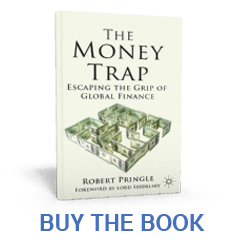25/02/14
As we approach the 7th anniversary of the outbreak of the crisis it is clear that its lessons have not been learnt. To my mind the key lessons are these:
- It was a financial crisis caused by a lack of discipline/coordination on major actors, including governments, central banks and the banks. It takes its place in a series of credit-fuelled boom-busts since the 1970s. From 2003 to 2008 money and credit were pumped up deliberately by the Fed and other central banks to ward off a phoney “deflation scare” (see the good account by Steve Hanke). Now the same pattern is repeating itself yet again.
- These have been grounded in similar conditions – lax monetary policies, financial innovation, ethical failures, mobile capital and erratic exchange rate fluctuations.
- Central bankers discount the dangers and trumpet their achievements. In 2004, in what was a crucial time in the build-up to the biggest episode of financial instability ever, Mr Bernanke rashly trumpeted their achievements and claimed credit for the Fed: “Better monetary policy may have been a major contributor to increased economic stability”. Major contributor, indeed!
- Financial institutions, governments and consumers naturally use the lack of discipline to pursue their short-run objectives. They are still trying to go back to something like business as usual, while the public interest suffers.
- ‘Business as usual’ includes so-called tighter financial regulation – the typical policy response after every crisis. Yet regulation will make the next crisis worse. It benefits regulators, governments and the politically powerful banks protected by their G-SIFI status.
- Central bankers are hopelessly conflicted, unable to admit their monetary policy-making models contributed to the disaster.
- As Brendan Brown reminds us in Eurocrash (Palgrave Macmillan, third edition now publishied) the Eurozone has failed to achieve one of its original primary goals – to shelter Europe from US monetary shocks. As a new institution driven by the idea of setting a new standard of monetary excellence the ECB “should have done better than its peers”. In fact, it also generated monetary shocks, panicking from irrational “deflation phobia”.
- Central banks are sowing the seeds of the next crisis, and some central bankers know it, but they have no other option within the current policy-making setup. Central bank independence is there to be talked about but not to be used.
- In each cycle they encourage banks to take excessive risks by cutting interest rates as in 1987, 1998 and currently – and if necessary bail them out at public expense as in 2008.
- Governments are not facing up to the fact that the old banking system is broken. Major banks need to be broken up. But the game is so good and brings such rewards for governments and bankers that they will do anything to make it last longer.
- It is hopeless to expect the Fed to take into account the worries of other countries and central banks in setting policies. It is constitutionally unable to do that. The world’s key central bank can change only if the US government enters into new international obligations that involve changes in its mandate.
New arrangements are therefore needed to govern the process of international adjustment and liquidity provision. See “Bare Bones” post.

